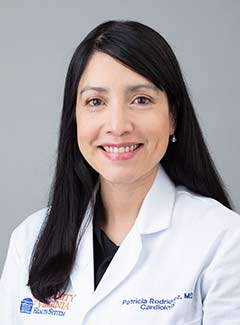
As she began her career in cardiology, Patricia Rodriguez Lozano, MD, quickly realized women face unique challenges in cardiovascular care.
“I noticed that women’s symptoms often differ from those of men and that traditional diagnostic and treatment approaches frequently fell short for our female patients,” she shares.
Determined to make an impact in this area, Rodriguez Lozano decided to focus her research on sex differences in cardiovascular disease, particularly in conditions like microvascular dysfunction and nonobstructive coronary disease.
Heart & Vascular Care for Women
Today, she’s director of UVA Health’s Women’s Heart Care Program, a multidisciplinary initiative integrating clinical care, research, and community outreach. “This role allows me to translate insights from my NIH-supported research into innovative therapies and tailored care strategies, ultimately working to improve outcomes for women,” she explains.
In this Q&A, Rodriguez Lozano details how cardiovascular disease affects women differently and how you can best safeguard women’s heart health.
Women with heart disease more often face misdiagnoses and testing and treatment delays. What’s behind this and how can providers combat it?
The testing delays and misdiagnoses are due to the often atypical presentation of symptoms, leading to missed or delayed diagnoses. Beyond typical risk factors, women face unique ones, such as:
- Pregnancy complications
- Autoimmune diseases
- Breast cancer and related treatments
- Early menopause (younger than 45)
- Psychological factors
Providers must incorporate these factors into their assessments, tailoring both preventive strategies and treatment plans based on a patient's individual profile.
Which heart conditions are more common in women?
Coronary microvascular disease (CMD) and spontaneous coronary artery dissection (SCAD). These often present with atypical symptoms and are easily overlooked.
Traditional diagnostic tests, such as angiograms, are effective at detecting large blockages but often miss the dysfunction in smaller vessels that occurs in CMD or the tears in arteries seen in SCAD.
Women with CMD may experience unexplained fatigue or chest discomfort, which don't show up on standard tests, making it difficult to diagnose.
Similarly, SCAD often occurs in young, otherwise healthy women with no traditional risk factors for heart disease, and can result in severe consequences if missed.
How can providers ensure women receive timely treatment for these conditions?
Early recognition — especially when patients don’t fit the usual profile for heart disease—should prompt further investigation with advanced imaging techniques or referral to a specialized center like our women's heart clinic, where we focus on these conditions.
Heart attack symptoms are often different in women. How should providers talk with women about this?
Subtle symptoms women may experience include:
- Shortness of breath
- Back pain
- Left/right arm pain or numbness
- Nausea
- Vomiting
- Fatigue or lack of energy
We must counsel our patients to be vigilant about these atypical symptoms and seek immediate medical attention if anything concerning arises.
How else can providers safeguard women’s heart health?
Women’s cardiovascular care doesn’t start with a cardiologist — it’s about working across the healthcare continuum. Pediatricians, primary care providers, obstetricians, and gynecologists all have a role to play in addressing heart health across a woman’s lifespan.
This means educating patients early, identifying risk factors, and referring to specialists when necessary.
Lifestyle modifications and early detection are key in preventing heart disease, so providers should proactively address heart health with every woman, helping her understand her risks and how to manage them.
Having a clear pathway for referrals and fostering a team-based mindset is crucial for improving outcomes.
When should providers considering referring patients to UVA Health’s Women’s Heart Care Program?
When they exhibit symptoms suggestive of heart disease, even if those symptoms don’t fit the typical profile.
We offer specialized diagnostic testing, like imaging for CAD and SCAD.
Our cardio-obstetric clinic is particularly important for pregnant patients with heart disease risk factors or symptoms concerning for possible heart disease.
By referring early, providers ensure that their female patients receive comprehensive, multidisciplinary care tailored to their specific cardiovascular needs.